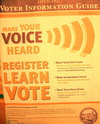 Tonight, a lot of the people in the neighborhood got together for what has become a pre-election ritual: We met at Jill and Piero Martinucci’s house, across the street from us, to go through the local and state ballots and talk about the issues.
Tonight, a lot of the people in the neighborhood got together for what has become a pre-election ritual: We met at Jill and Piero Martinucci’s house, across the street from us, to go through the local and state ballots and talk about the issues.
Kate and I were discussing when this tradition started; we moved into the neighborhood in 1988; I remember for sure meeting in 1992 — one of the notable events of the evening was that Jill’s brother Cliff, a Republican, declared he’d be voting for Clinton — and I don’t believe that was the first time we went over the ballot together. I believe that the meeting has been held at the Martinuccis every election but one, when we had people over to our house; we generally gather the Sunday immediately preceding the vote; we met a week earlier this year because Halloween is next Sunday. By this time, our neighborhood confabulation has come to have sort of a ritual aspect to it: Jill and Piero get pizzas and make salad, we and a couple other neighbors bring extra chairs, there’s plenty of wine, beer and soft drinks to get us through a three-hour or so discussion, and everybody chips in for the food.
The ballot this year is very long. We have 12 city issues (mostly tax measures to fund services hurting because of the state’s fiscal crisis; but there’s one, Measure Q, that would direct the police to ease enforcement of anti-prostitution laws; that one got a big “no” from our crowd tonight), three county measures, and another 16 statewide propositions (everything from how the budget should be structured to approving a new stem-cell research establishment in the state). Then you’ve got your candidates — no City Council elections in our district this year, but we have to pick a couple of school board candidates, members of the rent stabilization board, and board members for the local transit and community college districts. All that in addition to a representative to the state Assembly, a state senator, congressperson, U.S. senator, and POTUS. By my count, that’s 41 decisions to make.
 By consensus, we don’t take up issues like the presidential race and other top-of-the-ballot elections that people have probably made up their minds about already (although if someone really insists on talking about one of these, they generally can). So the focus is mostly on the numbered and lettered items on the ballot. Jill is an aide to one of the members of the City Council, and she lays out most of the local issues; our neighbor Doug is a retired teacher and longtime teachers’ union activist and usually has something specific to say about the people on the ballot for school board and school-funding measures when they’re on the ballot. Others might have particular interests — Piero is a small businessman and usually has something to say about the impact of all the tax and bond issues we’re looking at; Doug’s wife, Kay, is an accountant and also looks at the money measures pretty closely. For the rest, we all have our moments to speak up. OK, yes, I usually find something to sound off on at length.
By consensus, we don’t take up issues like the presidential race and other top-of-the-ballot elections that people have probably made up their minds about already (although if someone really insists on talking about one of these, they generally can). So the focus is mostly on the numbered and lettered items on the ballot. Jill is an aide to one of the members of the City Council, and she lays out most of the local issues; our neighbor Doug is a retired teacher and longtime teachers’ union activist and usually has something specific to say about the people on the ballot for school board and school-funding measures when they’re on the ballot. Others might have particular interests — Piero is a small businessman and usually has something to say about the impact of all the tax and bond issues we’re looking at; Doug’s wife, Kay, is an accountant and also looks at the money measures pretty closely. For the rest, we all have our moments to speak up. OK, yes, I usually find something to sound off on at length.
Tonight, I think the most prolonged discussion centered on similar state constitutional amendments either would or would not lock in the share of tax funds the state allocates to cities and other local governments. The measures are confusing: It’s tempting to lock things in to make sure the share the locals get doesn’t decrease; on the other hand, locking things in has a way of setting both a ceiling and a floor for funding. What we came to after talking it through was first, it’s not wise to write any more firm funding allocations into the state Constitution and second, we really want the governor and Legislature to do what they’re being paid to do, which is handle the money responsibly instead of throwing up their hands and running to the voters three or four times every couple years to decide how the state’s finances should be run.
The other measure that got a lot of talk was an initiative that would write an amendment into the Constitution requiring a small phone surcharge to provide $500 million a year for emergency medical services. The argument against: that it’s foolish to make this a constitutional amendment and that it does nothing to fix the root problems of the health-care systems (both arguments are pretty persuasive). The argument for: Emergency medical services are being overrun throughout the state, we’re in the middle of a bad fiscal crisis with only uncertain light at the end of the tunnel, and we have to do something to ease the situation, even if it’s not the ideal solution (I come down on that side of the issue).
 We got through our dozens of measures in two or two and a half hours. People took their kids home early, because it’s a school night. A few of us lingered to talk about a problem that’s not on the ballot — the apparently homeless guy who parks his decrepit RV all around the neighborhood and what can be done about him (more about that later). Kate and I brought our chairs home. Her comment afterward: “Looking around that table, I realized, boy, we’re getting old. We’ve been doing this for a long time.”
We got through our dozens of measures in two or two and a half hours. People took their kids home early, because it’s a school night. A few of us lingered to talk about a problem that’s not on the ballot — the apparently homeless guy who parks his decrepit RV all around the neighborhood and what can be done about him (more about that later). Kate and I brought our chairs home. Her comment afterward: “Looking around that table, I realized, boy, we’re getting old. We’ve been doing this for a long time.”
And for a long time to come, I hope.
(Pictures: Top: Getting ready for pizza and politics. Middle: Piero, sporting his brand-new November 2 button. Bottom: Our much beloved state voter guide.)
